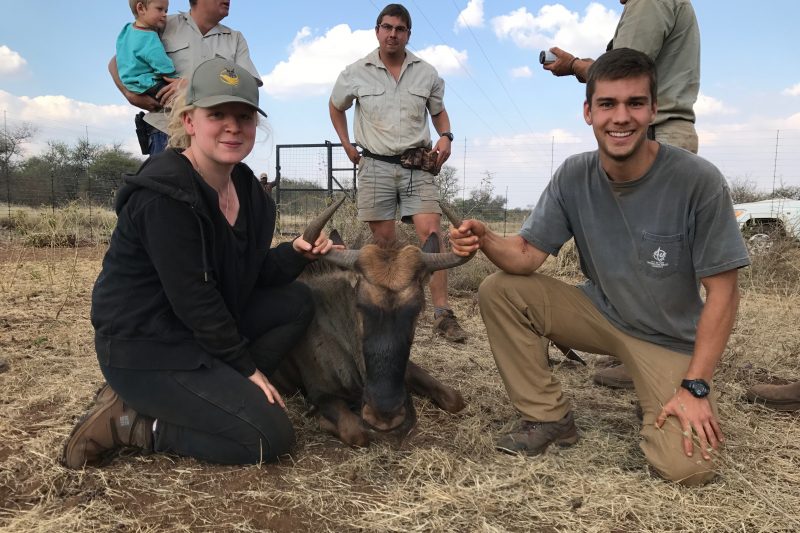The Call of the Wildebeest Jack Miller '19 has spent his summer in the bush of South Africa, learning about wildlife and conservation - and having a few close calls in the field.
“I have always been interested in conservation, but seeing the hands-on work required to do so was exciting. There was never a dull moment and this is something I would love to do in the future.”
Hometown: Charlotte, North Carolina
Major: Economics (pre-vet track)
Q. What are you doing this summer?
Through the Africa Conservation Experience (ACE), I shadowed a wildlife veterinarian in the Limpopo province of South Africa while also working with a wildlife capture team.
Q. What does an average day for you look like?
It is hard to say what an average day looks like because there are so many different things that can happen on any given day. There isn’t much routine out in the bush. Some days I am with the veterinarian darting different antelope and buffalo species in order to either relocate them or administer medical treatment. Other days, I am with the capture team literally chasing these wild animals on foot in order to herd them onto a transportation truck for relocation. Usually, things never go according to plan, and more often than not, anything that can go wrong tends to go wrong when working with wild animals.
Q. What was the most interesting thing you have learned while working on this project?
The most interesting thing I did in South Africa was mass capture. This is when a game farmer has populations of antelope that have become too high and the capture team comes in to remove certain amounts of each species population to relocate them or sell them to a different farm owner. The simplest way to describe this process is “controlled chaos.” In order to move the animals, we make a temporary “boma,” which is basically a corral that acts as a funnel to herd the animals onto Jurassic Park-styled transportation trucks. Then, a helicopter herds the animals into the boma and we then chase them on foot to herd them into the trucks. Chasing antelope in the boma was bar far the coolest thing I have ever done. It’s extremely dangerous, as most of the antelope species have large horns. Yet, it’s a truly exhilarating and unique experience to be running side-by-side with wildebeest, zebra, and all sorts of other antelope.
Q. What was the biggest challenge you faced?
I felt that I was adequately prepared for the work that I was doing, but nothing prepared me for a few life threatening situations. I went face-to-face with a hyena in the middle of the night, almost got trampled by buffalo, and was jumped over by some kudu (which is a type of antelope species). You can’t learn how to deal with those situations until they actually happen. And when they do happen, you must be very alert and ready to act or else you could end up severely injured, if not dead.
Q. Have you had any mentors during this time?
Dr. Louw Grobler was a great mentor during my experience. He is very knowledgeable about the medicine involved and how they work on each different antelope species. He is great to be around and we became very close friends. Another person who served as a mentor was Simon Riekert. He was the leader of the capture team and has a lot of experience working with wildlife animals. He knows their behavior well and taught me a lot about how to handle wild animals based on their behavior. It is easy to see that both men have an intense passion for wildlife and will do anything in their power to help save an animal, no matter how large or small.
Q. Has this experience impacted your studies or future plans in any way?
This experience has definitely engendered in me a desire to do conservation work in the future. I have always been interested in conservation, but seeing the hands-on work required to do so was exciting. There was never a dull moment and this is something I would love to do in the future.
Q. How did W&L prepare you for this experience?
The liberal arts education that W&L provides helped me to keep an open mind during my entire time in South Africa, and that made the experience so much more enjoyable. There were times when I was uncomfortable and situations were life-threatening, but being able to adapt to these circumstances and be open-minded made all the more difference in getting the most out of my experience.
Q. Why is this kind of experience important to W&L students?
I think that this kind of experience is truly eye-opening and provides a unique perspective into a completely different world. Working in an area where literally everything in the bushveld wants to kill you (even the trees) and where the nearest hospital is 2.5 hours away is a true testament to the desire to work with and support wildlife. The work involved is challenging, but that makes it all the more rewarding in the end.
If you know any W&L students who would be great profile subjects, tell us about them! Nominate them for a web profile.
 Jack Miller ’19 on location with a captured wildebeest
Jack Miller ’19 on location with a captured wildebeest
You must be logged in to post a comment.